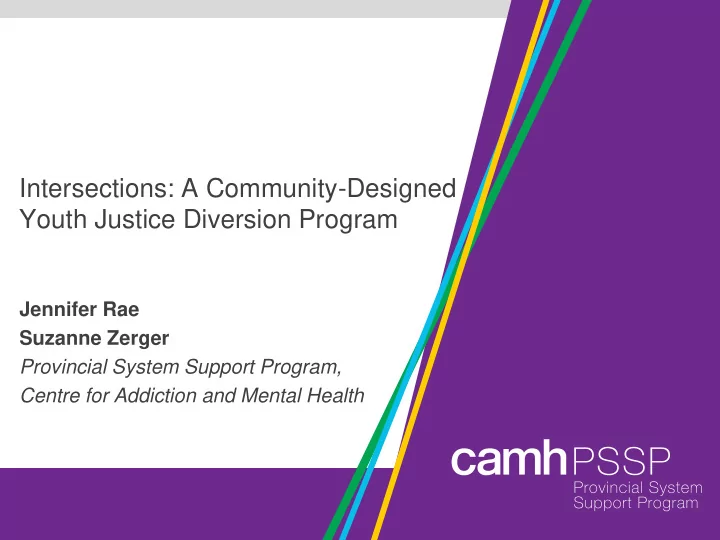

Intersections: A Community-Designed Youth Justice Diversion Program Jennifer Rae Suzanne Zerger Provincial System Support Program, Centre for Addiction and Mental Health
Centre for Addiction and Mental Health (CAMH) • Canada’s largest mental health and addiction teaching hospital • Leading research centre • Combines: Overview of CAMH and PSSP – Clinical care – Research – Education – Policy development – Health promotion 2
Centre for Addiction and Mental Health (CAMH) Provincial System Support Program (PSSP) • Supports Ontario’s Comprehensive Mental Health and Addictions Strategy through system interventions. • Five core functions: – Information management – Knowledge exchange – Equity and engagement – Implementation work – Evaluation 3
Centre for Addiction and Mental Health (CAMH) • Canada’s largest mental health and addiction teaching hospital • Leading research centre • Combines: Overview of the Intersections Program – Clinical care – Research – Education – Policy development – Health promotion 4
Origins of the Intersections Program • Champlain Youth Justice Service Collaborative – 150 organizations and agencies – Justice, housing, education, mental health, addictions, developmental services, child welfare • System gap: First police contact • Evidence-based intervention: Youth Justice Liaison Diversion – UK • Intention: Identify youth with mental illness and/or substance use issues, intervene early, connect to community-based services, redirect away from justice system • Structured, staged implementation process led by PSSP 5
Intersections Program 6
Intersections Program 7
Intersections Program 8
Intersections Sites • Intersections has been adopted in 7 eastern Ontario communities • Both rural and urban settings • First community launched in December 2014 • Over 400 youth and families have participated • Youth range from 6-17 years old, with average age of 13 9
Multi-Site Structure • Community-owned initiative • Cross-site bodies: – Oversight Committee – Community of Practice • Site-specific bodies: – Regional Advisory Committee 10
Centre for Addiction and Mental Health (CAMH) • Canada’s largest mental health and addiction teaching hospital • Leading research centre • Combines: Evaluation of Intersections – Clinical care – Research – Education – Policy development – Health promotion 11
Evaluation of Intersections • Evaluator embedded as a member of the Implementation Team • Common, cross-site data platform • Process evaluation completed in 2016 – Client data – including CANS assessment – 33 qualitative interviews with key stakeholders • Outcome evaluation completed in 2017 – Client data – 21 qualitative interviews with key stakeholders – Ontario Ministry of Health and Long-Term Care – police referrals to Emergency Departments – Police contact data 12
Evaluation Findings • Qualitative themes: – New collaborations across sectors – New efficiencies in referral and treatment access – Youth and families have positive perceptions of care • Client data: – Baseline needs: oppositional behaviour, impulse control, discipline at school, and attention deficit/hyperactivity – Referrals: mental health services and educational supports • Police data: – ~75% of youth do not have further contact with police • Ministry data: – Declining ER referrals in the region 13
Centre for Addiction and Mental Health (CAMH) • Canada’s largest mental health and addiction teaching hospital • Leading research centre • Combines: Implementation of Intersections – Clinical care – Research – Education – Policy development – Health promotion 14
Implementation Successes • Neutral party leading the process • Staged implementation across sites • Flexibility • Training and coaching • Partnership and communications structures • Champions 15
Implementation Challenges • Maintaining community ownership • Turnover • Ongoing training and outreach to police • Inconsistent, missing data • Using data to support decision-making • Cross-site consistency vs. local adaptation 16
Next Steps • Scaling up • Using evaluation findings to advocate for sustainable funding • Evaluation capacity building • Supporting data collection • Training and coaching support • Re-visiting partnership and communications structures 17
Acknowledgements • CAMH PSSP: – Patrick Russell (Evaluation Coordinator) – Jennifer MacDonald (Research Methods Specialist) – East Region Regional Implementation Team, including Madeleine Anderson (Evaluation Coordinator), Bryce Barker (Evaluation Coordinator), Tania Breton (Implementation Coordinator), Jamie Maskill (Manager) – Karen MacCon (Evaluation Director) and Sandra Cunning (Evaluation Director) • Champlain Youth Justice Service Collaborative members • Intersections Host Agencies, including: RNJ Youth Services, Laurencrest Youth Services, Phoenix Centre for Children and Families, Crossroads Children’s Centre 18
Centre for Addiction and Mental Health (CAMH) • Canada’s largest mental health and addiction teaching hospital • Leading research centre • Combines: Questions? – Clinical care – Research – Education – Policy development Jennifer.Rae@camh.ca – Health promotion 19
Recommend
More recommend